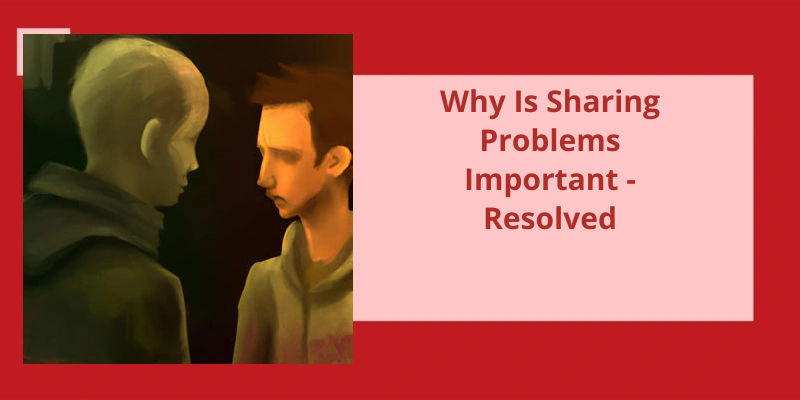In today's fast-paced world, where individualism and self-reliance are often championed, the concept of sharing problems may seem trivial or even unnecessary. However, the truth is that we as human beings are inherently social creatures, craving connection and understanding. By sharing our problems with others, we create a space for empathy, support, and potential solutions. It’s in these moments of vulnerability that we realize we aren’t alone in our struggles. Whether it's seeking advice, venting frustrations, or simply finding solace in a listening ear, sharing problems with others can provide a much-needed release. It’s through this act of sharing that we not only lighten our own emotional burdens but also gain valuable insights into the experiences and perspectives of others. By actively engaging in a reciprocal exchange of problems, we not only offer comfort and reassurance to others but also pave the way for collective problem-solving and personal growth. So, why is sharing problems important? It’s because sharing problems fosters interconnectedness, nurtures empathy, and ultimately strengthens our collective resilience as a society.
Should We Share Our Problems With Friends?
One of the most important aspects of human connection is the ability to share our problems with others. When faced with challenges, it’s only natural to seek support and understanding from those closest to us. Sharing our problems with friends can provide a sense of relief, as it allows us to unload the weight of our worries and receive emotional support in return. It’s through this exchange of vulnerability that true friendships are strengthened and deepened.
Furthermore, sharing our problems with friends can also provide valuable insight and different perspectives. Oftentimes, when we’re caught up in our own struggles, it can be difficult to see things from a different angle. By opening up to trusted friends, we allow ourselves to gain new insights, fresh ideas, and potential solutions that we may not have considered on our own. Their unique experiences and unbiased opinions can help us broaden our perspective and approach our problems more effectively.
Knowing that we aren’t alone in our struggles can be incredibly comforting and motivating. It reminds us that everyone faces challenges, and together, we can find solace and strength in each other. By sharing our problems, we not only give ourselves the opportunity to receive support, but we also create the space for others to share their burdens with us as well. This reciprocal exchange of support fosters a sense of unity and deepens our connections with others.
Furthermore, sharing problems with friends can also lead to personal growth and self-reflection. Sometimes, it’s only through verbalizing our challenges that we’re able to gain clarity on our own thoughts and feelings. By articulating our problems to others, we’re forced to confront and examine our struggles, which can be a catalyst for self-discovery and personal development. It’s through this process that we’re able to better understand ourselves, our needs, and our aspirations.
It provides a safe and supportive space where we can unload our burdens, gain new perspectives, foster connections, and foster personal growth. So, the next time you find yourself struggling with a problem, don’t hesitate to reach out to a trusted friend – remember, you don’t have to face it alone.
Sharing is an essential social skill that children should learn from an early age. By sharing, children develop the ability to make and maintain friendships, engage in cooperative play, take turns, negotiate, and deal with disappointment. Moreover, sharing also instills valuable lessons about compromise and fairness, teaching children that by giving a little to others, they can also receive something they desire.
Why Should We Share Things With Others?
Sharing is fundamentally important for various reasons. First and foremost, sharing allows us to establish and maintain meaningful connections with others. Whether it’s sharing possessions, experiences, or even our thoughts and emotions, sharing creates a sense of togetherness and fosters stronger relationships. By openly sharing with others, we invite them into our world and create opportunities for mutual understanding and empathy.
In the context of young children, learning to share plays a crucial role in their social development. Sharing teaches children important life skills that they’ll carry with them into adulthood. It allows them to develop the ability to empathize with others and consider their perspectives and needs. By sharing, children learn about compromise and fairness, understanding that giving a little to others can result in receiving something they desire as well.
When children engage in shared play or work on a task together, they learn the value of teamwork and the power of collective effort. Through sharing, children practice taking turns and learn to negotiate, building important problem-solving and communication skills that will benefit them throughout their lives.
Source: Sharing and learning to share – Raising Children Network
Additionally, sharing your problems allows others to offer support, guidance, and potentially even solutions that you may not have considered. It creates a sense of connection and helps build stronger relationships with those who’re willing to listen and lend a helping hand.
Why Is It Important to Share Your Problems?
You no longer carry the burden alone, and the weight on your shoulders becomes lighter. Talking about your problems allows you to release pent-up emotions and helps prevent them from festering inside. It gives you the opportunity to express yourself and gain a sense of validation, knowing that someone understands and empathizes with your struggles.
Sharing your problems also opens up the possibility of finding solutions. When you confide in others, they may offer valuable advice, suggestions, or experiences that can shed light on your situation. The act of verbalizing your problems can give you a fresh perspective, enabling you to see things from a different angle and consider alternative solutions you may haven’t thought of before.
Moreover, sharing your problems fosters connection and strengthens relationships. By opening up and allowing others to see your vulnerabilities, you create a space for trust and intimacy to flourish. It allows others to get to know you on a deeper level and vice versa.
In addition, when you share your problems, you invite others to do the same. It creates an environment where people feel comfortable sharing their own struggles and seeking support. This reciprocal exchange can lead to a sense of community, where everyone feels safe and understood. Furthermore, sharing your problems can inspire and motivate others. When they see you openly discussing your challenges, they may feel encouraged to do the same and seek the help they need.
The Benefits of Professional Therapy or Counseling for Problem Sharing
- Improved mental health
- Enhanced emotional well-being
- Increased self-awareness
- Effective stress management
- Improved communication skills
- Enhanced problem-solving abilities
- Greater self-acceptance
- Reduced feelings of loneliness or isolation
- Enhanced coping mechanisms
- Development of healthy coping strategies
- Improved relationships
- Gaining new perspectives
- Learning healthier coping mechanisms
- Reduced anxiety and depression symptoms
- Improved overall well-being
Conclusion
By reaching out to others and opening up about our own struggles, we create a platform for support and understanding. This exchange of problems not only alleviates our own burdens but also allows us to gain perspective by hearing about the challenges faced by others. Ultimately, the process of sharing problems builds a sense of empathy and connectedness, reminding us that we aren’t alone in our struggles. By fostering a culture of openness and support, we not only find relief but also create a space for growth and collaboration, where we can help each other navigate the complexities of life.






